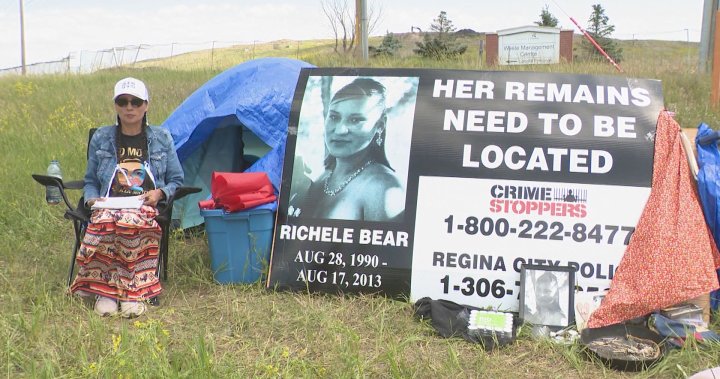Michele Bear, a member of the Standing Buffalo Dakota First Nation, has initiated a hunger strike and established a camp at the entrance of the Regina Landfill, demanding that city authorities conduct a search for the remains of her daughter, Richele Bear, who was murdered in 2013. Bear insists that the landfill may hold her daughter’s remains and is calling on the City of Regina and local police to take immediate action. Her protest reflects broader national concerns about the handling of cases involving missing and murdered Indigenous women and girls. The situation has attracted media attention and increased pressure on municipal officials to respond to her urgent plea.
Background of the Case
Richele Bear, the daughter of Michele Bear, was murdered in 2013. Since then, her remains have not been recovered, leaving the family with unresolved grief and unanswered questions. Michele Bear, deeply convinced that her daughter’s remains could be located at or near the Regina Landfill, has taken the extraordinary step of initiating a hunger strike coupled with a protest camp at the landfill’s entrance. Her actions highlight the ongoing struggle many Indigenous families face in seeking justice and closure.
Demands and Actions Taken
Michele Bear is demanding that the City of Regina and local law enforcement agencies conduct a thorough search of the landfill site. She believes that due to the nature of the investigation and the timeline of the events, the site may contain critical evidence or the remains of her daughter. By setting up a camp and refusing to eat, Bear is drawing public and official attention to her urgent call for action.
The protest has gained traction in media outlets, amplifying the issue beyond Regina and shining a spotlight on local authorities’ responsibilities. Michele Bear’s determination underscores the need for respectful handling of Indigenous cases and responsive measures from municipal officials.
Context Within Broader National Issues
This protest is emblematic of wider systemic concerns regarding missing and murdered Indigenous women and girls (MMIWG) across Canada. Indigenous communities have historically faced challenges with law enforcement and governmental agencies regarding the investigation and resolution of such cases.
The National Inquiry into Missing and Murdered Indigenous Women and Girls has documented long-standing issues of under-resourcing, neglect, and mistrust that have hampered investigations, often leaving families without answers. Michele Bear’s hunger strike brings these issues into sharp relief, emphasizing the urgent need for improved procedures and respect for Indigenous voices in criminal justice processes.
Response from Authorities and Next Steps
As of now, city officials and law enforcement have yet to commit publicly to the specific search demands but have acknowledged awareness of the ongoing protest and the broader issues it represents. The increasing media coverage and community support place mounting pressure on authorities to respond with transparency and urgency.
Observers anticipate that the situation may lead to discussions about policy reviews or collaborative initiatives with Indigenous communities to ensure respectful, culturally informed investigations in the future.
Conclusion
Michele Bear’s hunger strike at the Regina Landfill symbolizes a powerful plea for justice and recognition. It calls attention not only to her personal tragedy but also to the broader call for systemic change in how cases involving Indigenous women and girls are handled in Canada. The outcome of this protest may influence future responses of municipal and policing bodies in addressing the needs and rights of Indigenous families seeking closure.
Michele Bear’s hunger strike at the Regina Landfill represents a poignant appeal for justice and accountability. Her actions draw critical attention to both her personal loss and the wider systemic challenges faced by Indigenous communities across Canada in securing thorough and respectful investigations into cases of missing and murdered Indigenous women and girls. This protest underscores the need for immediate and transparent responses from city officials and law enforcement, as well as long-term reforms that honor the voices and rights of Indigenous families. The developments stemming from this demonstration could have significant implications for future policies and collaborative efforts aimed at addressing these deeply rooted issues.

